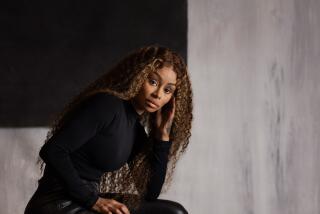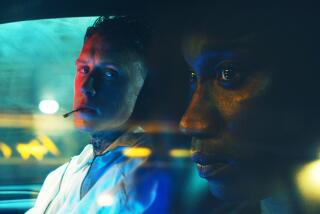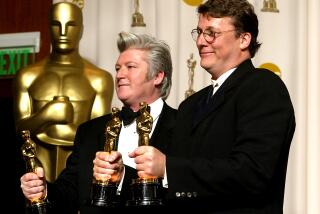Facing the competition: The makeup of ‘I, Tonya’ and ‘Battle of the Sexes’
For actresses Margot Robbie and Emma Stone, playing athletes Tonya Harding and Billie Jean King, respectively, meant sweat, sports lessons and hours in the makeup chair.
As the makeup department head for “I ,Tonya,” Deborah La Mia Denaver strove to capture the essence of Olympic figure skater Tonya Harding, without crafting a carbon copy of her features.
“I always felt that there was a lot of stress in Tonya’s face and I tried to duplicate that on Margot,” said Denaver.
To counteract the naturally “smiley” quality of Robbie’s features, Denaver pulled down the corners of the actress’ eyes with dabs of eyelash adhesive, and the corners of her mouth with dark shading. Denaver bleached Robbie’s high, arched eyebrows, and applied new brow hairs in a lower and fuller shape. She also disguised Robbie’s natural rosiness to mimic Harding’s paler complexion.
WATCH: Video Q&A’s from this season’s hottest contenders »
“I do have a secret weapon, and the old-school makeup artists will know it,” said Denaver. “It’s William Tuttle’s Special Hi-Lite. It’s like a fleshy tone white cream. In this case, I used it to widen her nose, to bring the chin out. It really pulled through for me.”
Harding first skates into the frame at age 4, and the film follows her into her 40s— which required Robbie to wear prosthetics while playing the teenage Harding.
“She had two cheek pieces,” said Denaver. “She had a nose piece. She had a chin piece. She had a full wrap around neck piece that helped us get the weight gain on her. And then at certain times, she had eye bags on as well.”
To usher Harding through the 1970s, 1980s, 1990s and beyond, Robbie also donned period wigs, designed by hair department head Adruitha Lee.
“Battle of the Sexes” is set squarely and unmistakably in the year 1973, when women’s tennis champion Billie Jean King defeated former men’s tennis champion Bobby Riggs in a high-stakes exhibition match.
Makeup department head Torsten Witte got in touch with 1973 by airbrushing the actors with St. Tropez self-tanner at least once a week.
“Everybody was super tan,” he said. “No one was wearing sunscreen on the court.”
To further transform Stone, Witte added sunspots, and shaded her jawline and cheekbones to evoke the harder features of a competitive athlete. Then he added the accessory that brought it all together: King’s classic 1970s eyeglasses.
For Riggs, played by actor Steve Carell, Witte added even more sunspots, along with plenty of perspiration. And to mask Carell’s perfect smile, he used prosthetic teeth.
“Steve has 2017, living in California, beautiful, white, big teeth, and that was so not what Bobby Riggs looked like back in the day,” Witte said.
Witte relied on these relatively subtle details to create the aesthetic for the film, working in collaboration with hair department head Frida Aradottir. The goal was to create makeup that didn’t loudly call attention to itself, but contributed to the film’s overall aesthetic and feel.
Witte’s work faced the ultimate test when King visited the set.
“We were all just panicking [that] she [would be] like, ‘Oh, this is not how my eyebrows were. Those are not my glasses that I was wearing.’ But she was so amazing,” said Witte. “And she is the fairest, nicest competitive athlete I have ever met.”
Both Witte and Denaver enjoy partnering with actors to help bring their characters to life.
“Helping develop that visual really helps the actors, and you can see that transition as you’re creating it,” said Denaver. “And it’s something really special and enjoyable.”
Witte added: “Emma Stone sits down, and then Billie Jean leaves the trailer,” said Witte. “Or Steve Carell comes in, and then this other person walks out. It’s pretty amazing!”
More to Read
From the Oscars to the Emmys.
Get the Envelope newsletter for exclusive awards season coverage, behind-the-scenes stories from the Envelope podcast and columnist Glenn Whipp’s must-read analysis.
You may occasionally receive promotional content from the Los Angeles Times.






